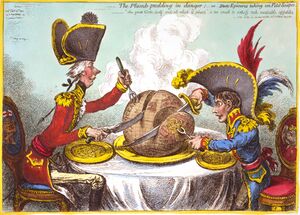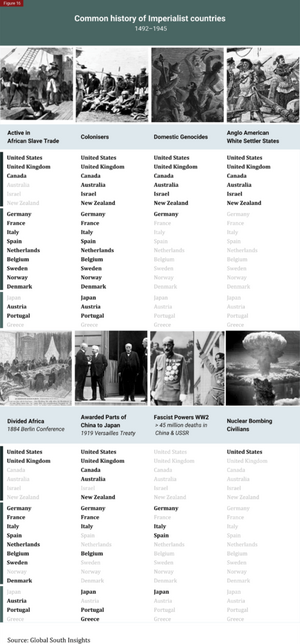More languages
More actions

Colonialism is a phenomenon in which a state or group of people subjugate a foreign land for the purpose of private enrichment via resource extraction and exploitation of its people. Marxism views colonialism in the modern era as a tool of capitalism, enforcing the interests of the ruling class abroad and destroying cultures and nations all around the world. Marx thought that working within the global capitalist system, colonialism is closely associated with uneven development. It is an "instrument of wholesale destruction, dependency and systematic exploitation producing distorted economies, socio-psychological disorientation, massive poverty and neocolonial dependency".[1]
Colony is a country or a region occupied and dominated by imperialist aggressors, being completely subjugated politically, economically and culturally. The people who had suffered from the disaster of slavery, caste subjugation and capital's chains had to suffer from national subjugation, along with the class oppression, in colonized lands.
— O Song Chol, The Torch of Juche That Illuminates Society
Colonies are typically forced into specific modes of production by their colonial rulers. The search for raw materials and the current search for new investment opportunities is a result of inter-capitalist rivalry for capital accumulation. Lenin regarded colonialism as the root cause of imperialism[citation needed], as imperialism was distinguished by a monopoly capitalism kept alive by new and continued colonial exploits.
European colonialism[edit | edit source]

Between 1860 and 1899, the British colonial empire grew from 2.5 to 9.3 million square miles and 126.4 million to 309 million inhabitants. During the same time, the French colonial population grew from 3.4 to 56.4 million, and Germany formed a colonial empire that subjugated 14.7 million.
Between 1876 and 1900, the percentage of land under U.S. or European colonial rule rose from 10.8% to 90.4% in Africa, 56.8% to 98.9% in Polynesia, and 51.5% to 56.6% in Asia. In addition to the previously mentioned countries, Belgium and Portugal had colonial empires with 30 million and nine million inhabitants, respectively.[2]
Colonialism in the Era of Imperialism[edit | edit source]
Lenin said this of colonialism[3]:
Hence, we are passing through a peculiar period of world colonial policy, which is closely associated with the “latest stage in the development of capitalism,” with finance capital. For this reason, it is essential first of all to deal in detail with the facts, in order to ascertain exactly what distinguishes this period from those preceding it, and what the present situation is. In the first place, two questions of fact arise here. Is an intensification of colonial policy, an intensification of the struggle for colonies, observed precisely in this period of finance capital? And how, in this respect, is the world divided at the present time?
... Since we are speaking of colonial policy in the period of capitalist imperialism, it must be observed that finance capital and its corresponding foreign policy, which reduces itself to the struggle of the Great Powers for the economic and political division of the world, give rise to a number of transitional forms of national dependence. The division of the world into two main groups – of colony-owning countries on the one hand and colonies on the other – is not the only typical feature of this period; there is also a variety of forms of dependent countries; countries which, officially, are politically independent, but which are, in fact, enmeshed in the net of financial and diplomatic dependence. We have already referred to one form of dependence – the semi-colony.
... Fourthly, monopoly has grown out of colonial policy. To the numerous “old” motives of colonial policy, finance capital has added the struggle for the sources of raw materials, for the export of capital, for “spheres of influence,” i.e., for spheres for profitable deals, concessions, monopolist profits and so on; in fine, for economic territory in general. When the colonies of the European powers in Africa, for instance, comprised only one-tenth of that territory (as was the case in 1876), colonial policy was able to develop by methods other than those of monopoly – by the “free grabbing” of territories, so to speak. But when nine-tenths of Africa had been seized (approximately by 1900), when the whole world had been divided up, there was inevitably ushered in a period of colonial monopoly and, consequently, a period of particularly intense struggle for the division and the redivision of the world.
See also[edit | edit source]
References[edit | edit source]
- ↑ Watts, Michael (2005). "colonialism, history of". In Forsyth, Tim (ed.). Encyclopedia of International Development. Routledge. ISBN 9781136952913.
- ↑ Vladimir Lenin (1916). Imperialism, the Highest Stage of Capitalism: 'Division of the World among the Great Powers'. Moscow: Progress Publishers. [MIA]
- ↑ Vladimir Lenin (1916). Imperialism, the highest stage of capitalism. Progress Publishers.
